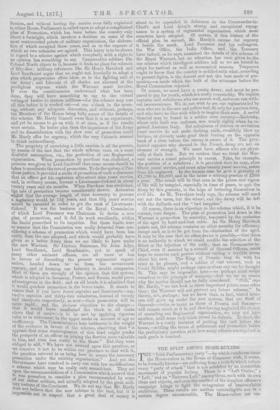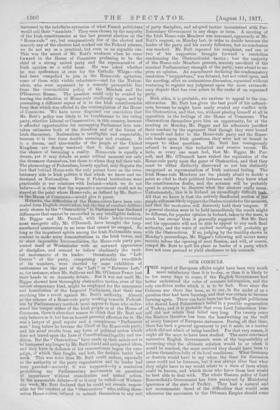THE SPLIT AMONG HOME-RELERS.
THE "Irish Parliamentary party "—by which cumbrous name the Homo-rulers in the House of Commons wish, it seems, to be formally known—are suffering from a malady which infects every "party of attack" that is not solidified by an irresistible movement of popular feeling. There is a "Left Centre," a "Left," and an "Extreme Left" among them, each with its own ideas and objects, and even the conduct of the simplest offensive campaign brings to light the antagonism of irreconcilable ambitions. These results are neither unintelligible nor in a certain degree unreasonable. The Home-rulers are em- bariassed by the indefinite extension of what French politicians would call their "mandate." They were chosen by the majority of the Irish constituencies at the last general election on the " Home-rule " cry, but comparatively few of the elected and scarcely any of the electors had worked out the Federal scheme, we do not say as a practical, but even as an arguable one. This was the secret of Mr. Butt's weakness when he came forward in the House of Commons professing to be the chief of a strong united party and the representative of Irish opinion as a solid mass. He was asked whether he was spokesman at once for the Catholic Whigs—who had been compelled to join in the Home-rule agitation, some of them with visible reluctance—and for the Nation- alists, who were separated by a scarcely perceptible line from the irreconcilable policy of the Mitchels and the O'Donovan ]Ioseas. The question could only be evaded by leaving the definition of Home-rule studiously vague, and by presenting a different aspect of it to the Irish constituencies from that which was offered to the contemplation of the House of Commons. We have never disguised our conviction that Mr. Butt's policy was likely to be troublesome to the ruling party, whether Liberal or Conservative, in this country, because it afforded opportunities for entrapping Parliament into mis- taken estimates both of the direction and of the forces of Irish discontent. Nationalism is intelligible and respectable, because it is free from double meanings and evasions. It is a dream, and nine-tenths of the people of the United Kingdom are firmly resolved that it shall never have the chance of becoming a reality. Home-rule is equally a dream, yet it may delude at some critical moment not only the dreamers themselves, but those to whom they tell their tale. The phraseology of Federalism, loosely applied, may disguise the fact that behind Home-rule the only potent force on the revo- lutionary side in Irish politics is that which we know and un- derstand as Nationalism. Even if Federal institutions were practicable in our relations with Ireland—which we do not believe—it is clear that the separative movement could not be stayed at the point where Home-rule, as defined by Mr. Butt— in the House of Commons—would give it pause. Hitherto, the difficulties of the Home-rulers have been con- cealed from English observation, but the line of conduct deliber- ately chosen by the " Obstructives " in Parliament has disclosed differences that cannot be reconciled in any intelligible fashion, Mr. Biggar and Mr. Parnell, with their lately-recruited most energetic ally, Mr. O'Donnell, have brought the long- smothered controversy to an issue that cannot be escaped. So long as the impatient spirits among the Irish Nationalists were content to make noisy demonstrations in the Irish towns, and to elect impossible Irreconcilables, the Home-rule party pre- sented itself at Westminster with an outward appearance of discipline, and seemed to follow obediently the tacti- cal movements of its leader. Occasionally the "Left Centre" of the party, comprising probably two-thirds of its numbers, were startled by some exhibition of restlessness on the part of the " Left " or "Extreme Left," as, for instance, when Mr. Sullivan and Mr. O'Connor Power lost their heads in an Amnesty debate. But it was not until Mr. Biggar showed how thoroughly obstructive tactics, even of the merest elementary kind, might be employed for the annoyance and humiliation of the Imperial Parliament, that there was anything like a revolt against Mr. Butt's authority, Absurd as the scheme of a Home-rule party working towards Federal- ism by Parliamentary methods must appear to those who under- stand the temper either of the Irish people or of the House of Commons, there is abundant reason to think that Mr. Butt not only believes in it, but has an honest parental affection for it. He was a lawyer of good repute and a conspicuous "Parliament man" long before he became the Chief of the Home-rule party, and his mind revolts from any form of political action which does not travel upon the lines of Constitutional legality and tra- dition. But the" Obstructives" have made up their minds not to be hampered any longer by Mr. Butt's timid and antiquated ideas, and they have in defiance of his remonstrance begun the cam- paign, of which they fought, and lost, the decisive battle last week. This was more than Mr. Butt could endure, especially as the authority of the party organisation and its leader had been guarded—securely, it was supposed—by a resolution prohibiting any Parliamentary movements on questions of importance without consultation and united action. In the memorable debate—if so it may be called—of Wednes- day week, Mr. Butt declared that he could not remain respon- sible for the conduct of the " Obstructives " who, calling them- selves Home-rulers, refused to submit themselves to any era of party discipline, and adopted tactics inconsistent with Par- liamentary Government in any shape or form. A meeting of the Irish Home-rule Members was convened, apparently at Mr. Butt's request, on Monday last, in order to decide between the leader of the party and his unruly followers, but no conclusion was reached. Mr. Butt repeated his complaint, and one or two of his supporters brought forward a resolution condemning the Obstructionist tactics ; but the majority of the Home-rule Members present, scarcely one-third of the nominal Parliamentary strength of the party, were afraid to ex- press an opinion. An amendment declaring the condemnatory resolution "inopportune," was debated, but not voted upon, and the meeting, after an acrimonious discussion, separated without venturing to register any judgment upon the most extraordi- nary dispute that has ever arisen in the ranks of an organised party.
Both sides, it is probable, are anxious to appeal to the con- stituencies. Mr. Butt has given the best proof of his earnest- ness, because he might have easily evaded any conflict with the Obstructives, and that, too, without placing himself at all in opposition to the feelings of the House of Commons. The Obstructives themselves gave him an opportunity, for at the meeting on Monday, Mr. Biggar and his adherents justified their conduct by the argument that though they were bound to consult and defer to the Home-rule party and the Home- rule leader upon Irish questions, they were not so bound in respect to other questions, Mr. Butt has courageously refused to accept this technical and evasive excuse. He feels, as every one must feel, that Mr. Biggar, Mr. Par- nell, and Mr. O'Donnell have staked the reputation of the Home-rule party upon the game of Obstruction, and that they must be either distinctly disavowed or not less distinctly recognised as representatives of Irish national feeling. The Irish Home-rule Members are too plainly afraid to decide a point so vital to their political fortunes until they know what the constituencies desire, and the autumn will be probably spent in attempts to discover what the electors really mean. Unfortunately, this is in Ireland an exceedingly difficult tailk. All that we know is that the actively disaffected section of 'tile people will most likely support the Obstructionists for the moment, and that the moderates will discreetly hold their tongues. If a general election were to be held immediately the result might be different, for popular opinion in Ireland, taken in the mass, is much less enrage' than is generally supposed. But Mr. Butt and his opponents will not be able to appeal to any such final authority, and the voice of excited meetings will probably go with the Obstructives. If so, judging by the timidity shown in Monday's proceedings, Mr. Biggar's following will secure many recruits before the opening of next Session, and will, of course, compel Mr. Butt to quit his place as leader of a party which does not even pretend to yield obedience to his counsels.































 Previous page
Previous page